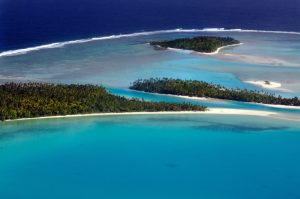The Pacific Islands, like the Cook Islands, are known for pristine beauty, crystal clear lagoons, vibrant coral reefs, and rich marine biodiversity. As Cook Islanders, we are traditional stewards of our lands and seas, as we depend on the ocean to sustain our livelihoods. The protection and sustainable use of our oceans is of paramount importance.
On November 25, delegates from 175 countries began the fifth and final round of negotiations for the crucial Global Plastics Treaty in Busan, South Korea. This is a make-or-break moment for the Cook Islands, and that is why we are pushing for a strong, binding global treaty to reduce plastic production and control pollution.
We cannot continue with business as usual. Plastic pollution is fueling the climate crisis that poses an existential threat to our people. The science shows that plastic production alone could consume 25-31 percent of the entire remaining carbon budget and the plastics industry would overshoot its budget by 360 percent if current trends continue.
The Cook Islands alongside the Pacific Small Island Developing States have proudly demonstrated leadership in international environmental efforts and have been at the forefront of the push for an ambitious and effective plastics treaty. But we cannot solve this problem alone. We are calling on our international colleagues to demonstrate meaningful commitments.
There is a growing crisis of plastic pollution in the Pacific, and there is a direct correlation between plastics production and pollution. Plastic production has more than doubled in the last two decades and we have seen the amount of plastic pollution that ends up in our oceans and marine food chains increase significantly.
Within the vast waters and coastlines of the Cook Islands, we are subject to plastic waste and debris from all over the world washing up on our shores. Our seas are filled with ghost fishing gear, ensnaring our coral reefs and killing threatened marine life.
Because marine plastic litter is primarily made up of microplastics, it may not be completely visible to the naked eye but is nevertheless harmful to us and the marine life within our waters. Over 700 marine animals, including those in the Cook Islands, suffer from plastic ingestion or entanglement. These microplastics have now made their way up the food chain, with recent research estimating that the average person consumes or breathes up to 211,000 microplastic particles every year.
We Pacific Islanders heavily rely on marine resources for food, and we are increasingly facing risks of resource depletion and insecurity.
While these impacts alone should be enough for action to be taken, the wider implications for the climate emergency should also make global leaders sit up and take action. Pacific Island nations have been grappling with these catastrophic human-induced issues for far too long. Despite having one of the most inconsequential and smallest carbon footprints, we are among the first to suffer catastrophic impacts of climate change due to our severe remoteness and vulnerabilities. Over 99 percent of plastics are made from chemicals derived from fossil fuels. We desperately need a global approach to manage and mitigate accordingly.
Pacific Island Nations are being forced to bear the costs of a problem we did not create, contributing to only 1.3 percent of global mismanaged plastic waste. The biggest producers and exporters of plastics must be held accountable and made to rectify this global inequality by obligating major plastic producers to act. We alone cannot solve a crisis of this magnitude. This week is a last chance avenue for this to happen.
Now is the moment. We need a treaty that mandates reductions in plastic production and demand across the world; voluntary commitments will not be able to stop the increasing tide of plastic pollution.
Analysis has shown that with strong controls to limit and ban just a few high volume polymers, the treaty could avoid 47.6 gigatons of carbon dioxide emissions between 2025 and 2050, while also avoiding the need to manage 8.3 billion tonnes of plastic waste. We know what must be done, all that is left to do is act decisively.
For too long, Pacific Islands like the Cook Islands have faced the burden of the actions of others, and we have been shouting in the void of an international landscape that neglects the priorities of our people. The final talks in Busan offer an opportunity to stop the trajectory we are currently on through a treaty with binding regulations, measurable targets and adequate means of implementation.
It is not too late to hope for a possible future where our islands and our shared ocean are free from plastic waste, protecting and preserving the pristine nature and biodiversity of the Cook Islands and beyond.

































